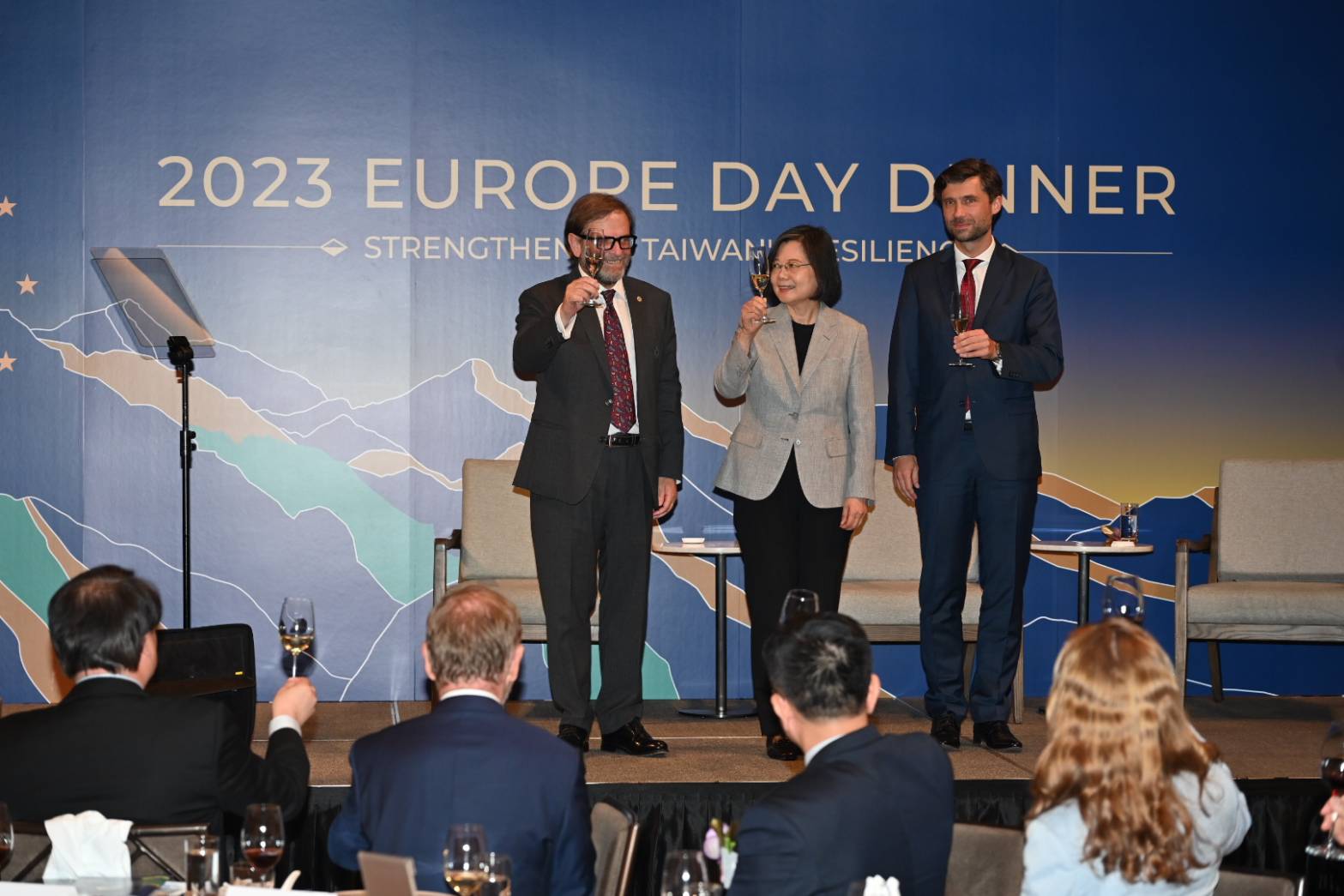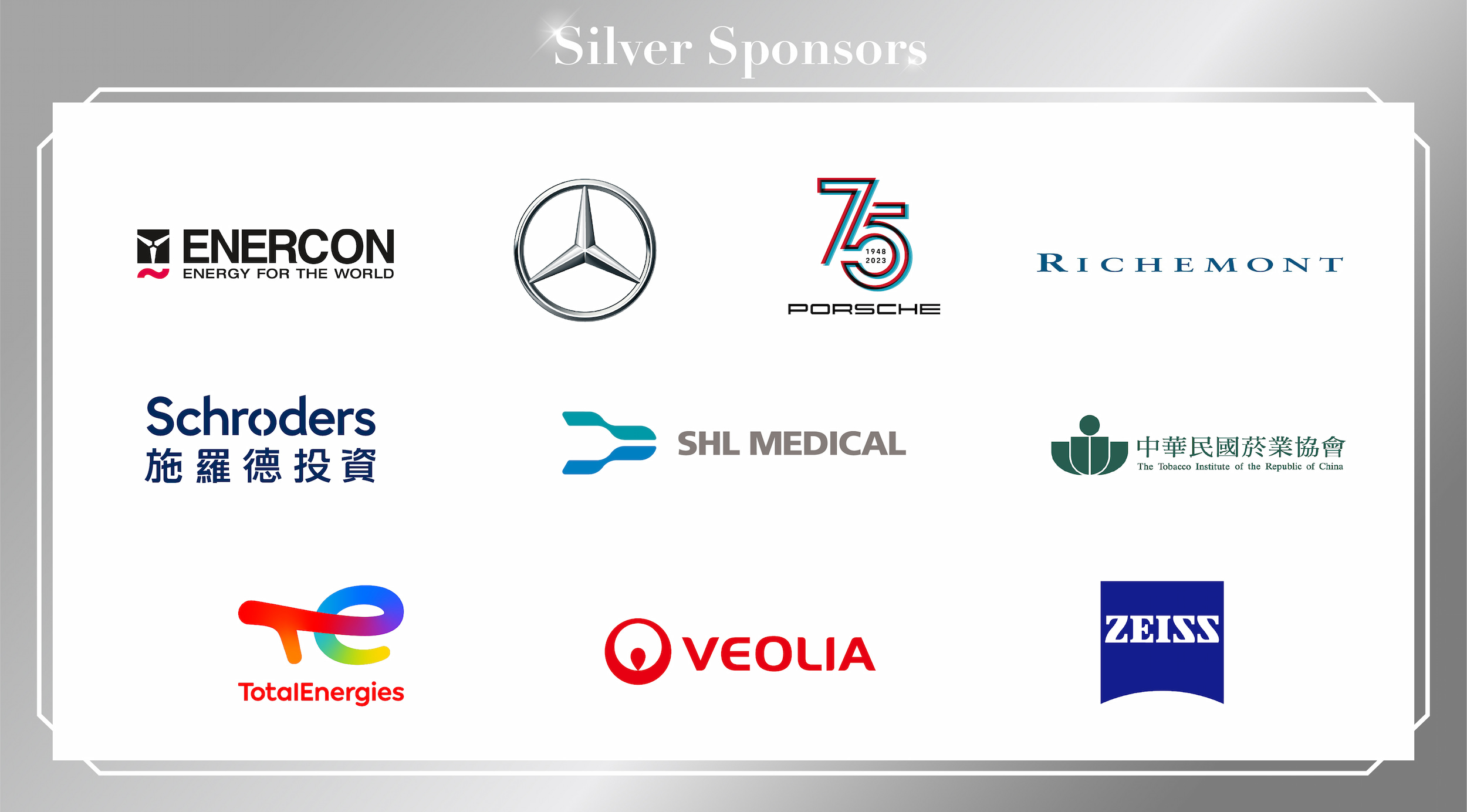2023 Europe Day Dinner

The ECCT is ready to support Taiwan to boost the resilience of the economy as well as tackle social challenges. Speaking to a capacity crowd at the ECCT’s annual Europe Day Dinner on the theme of “Strengthening Taiwan’s Resilience”, ECCT chairman Giuseppe Izzo said that the ECCT is committed to helping Taiwan to strengthen its resilience in the areas of energy security, electric vehicles, digitalisation, population sustainability, healthcare and food security, among others. The chairman also used his speech to highlight the numerous ways that the European business community is contributing to Taiwan’s economic and social development in cooperation with its local business partners, government and civic organisations.
At the dinner, speeches were also delivered by ROC President Tsai Ying-wen and Filip Grzegorzewski, Head of the European Union’s (EU) European Economic and Trade Office (EETO). The event was also attended by a record-breaking 750 guests, including senior government officials and executives from European and Taiwanese multinational companies. The annual dinner is held to celebrate Europe Day, the anniversary of the Schuman Declaration in 1950, which ultimately led to the formation of today’s European Union.
In his speech, Chairman Izzo noted that Taiwan’s energy security is vulnerable due to a dependence on fossil fuels, a lack of renewable energy, storage facilities for natural gas and insufficient grid infrastructure. The ECCT has consistently advocated that transitioning to renewable energy sources is the best way to increase Taiwan’s energy security and independence. However, Taiwan is falling behind in reaching its own renewable energy targets.
“While Taiwan has been a leader in Asian offshore wind and creating a flourishing supply, the highly restrictive local content requirements are slowing down progress and making projects more expensive, putting this leadership at risk. Taiwan must remain an attractive destination for international investment in an offshore market that is booming globally,” he said. In addition, the permitting process remains overly complicated. For example, the industry was caught by surprise when Environmental Impact Assessment requirements for onshore wind were increased from 250 to 500 metres, affecting an estimated 50% of onshore projects currently under development, which is further adding to project permitting uncertainties for developers and delaying the supply of affordable green energy that Taiwan’s SME’s so urgently need. “This shows a clear disconnect between ambitions to achieve energy security and net zero and the policies and procedures that are supposed to enable them,” he said.
To strengthen energy resilience, in addition to existing solar, hydro and wind energy technologies, the chairman said that Taiwan should take full advantage of the great potential in geothermal energy, floating offshore wind and the use of green hydrogen. To ensure a sufficient and resilient grid infrastructure, the grid and energy storage build-out needs to be completed in sync with when renewable capacity comes online.
The transition to electric vehicles will increase resilience in transport but needs the government’s support in building charging infrastructure in the form of subsidies and reform of existing building and land use regulations. Izzo noted that ECCT members are actively involved and committed to Taiwan’s energy transition but need the government’s help to take all the steps necessary to remove impediments and prioritise the build-out of renewable energy.
In addition to the energy transition, the chairman offered the chamber’s assistance to the administration in accelerating digital and net-zero transformations to ensure the competitive strengths and sustainable developments of Taiwan and its industries. “We’d all agree that only the countries and companies that are able to rapidly and intelligently seize opportunities and respond to the challenges in the course of these transformations will eventually emerge as the winners. As Taiwan’s trusted technology partners, European companies are committed to deploy the essential technologies faster together with your administration,” he said.
On the question of demographics, Izzo said that Taiwan’s future development will only be possible with a sustainable and resilient population but that Taiwan has one of world’s lowest birth rates and is on track to become a super-aged society by 2025, which will have profound consequences for society and the economy as the workforce decreases and the number of ageing dependents increases. The chairman stressed that there is no silver bullet and that addressing the many challenges will take coordinated efforts among stakeholders. The ECCT is ready to help and recently set up the Family Friendly Alliance to work with the government, corporations and NGOs to share ideas and best practices and policies designed to support a sustainable population, economic and social development in Taiwan. The FFA has already hosted a summit featuring government and industry experts and released the results of a survey with recommendations on how to improve the family friendliness of workplaces.
To maintain a sustainable workforce requires not just addressing demographic issues but also immigration and labour law issues, especially since Taiwan is in competition with countries across the globe for talent.
According to the chairman, Taiwan’s Employment Gold Card scheme has attracted a diverse and talented group of people to live and work in Taiwan. However, the qualifications to enter the programme are overly strict. Taiwan also faces a shortage of workers in the hospitality and other service industries, but employers are restricted from hiring foreign labourers. The ECCT therefore recommends relaxing the relevant restrictions in order to attract a larger and more diverse range of foreign talent and labourers from Europe, the Americas and elsewhere in Asia.
The chairman also called for labour law reforms that create modern regulations which meet the needs of today’s society, striking the right balance between providing both flexibility and protection to workers.
A resilient society needs a healthy population. Taiwan has one of the world’s most comprehensive and efficient healthcare systems that is popular with users and praised internationally. But doctors and nurses are overworked and many new medicines and treatments are not covered. Critical health outcomes, such as life expectancy, cancer survival rate and infant mortality are falling behind other advanced economies. The system will come under increasing strain as the population ages and the workforce declines. To increase resilience, the chairman said that Taiwan will need to spend a little more on healthcare now and into the future.
Izzo remarked that the ECCT welcomed increased cooperation between Taiwan and European countries over the past year, but that more could be done to encourage international cooperation and investments in Europe, in partnership with European countries and companies in the fields of technology, AI, digitalisation and cybersecurity.
Finally, as a major food importer, the chairman said that it does not make sense for Taiwan to maintain restrictions and complex red tape requirements for food imports from the EU, a single market with the world’s most robust standards for food safety. Many of the European food products currently being restricted are specialty foods that do not directly compete with local production. Resolving bilateral food trade issues would increase Taiwan’s food security, and also benefit farmers, food producers and consumers in both Taiwan and Europe.
The chairman concluded by saying that ECCT members remain committed to doing their part to keep the Taiwan miracle going and helping Taiwan to further strengthen its resilience now and into the future.
In his speech, Filip Grzegorzewski stressed the importance and benefits of EU-Taiwan relations, given rising trade and investments, noting that European companies hold around 25% of the stock of foreign direct investments and accounted for more than 36% of all foreign investment in Taiwan in 2022. He added that the EU has a very close semiconductor supply chain relationship with Taiwan, noting that in 2022, 27% of Taiwan's imported semiconductor equipment came from the EU.
The EETO head also reiterated the ECCT chairman’s sentiments regarding European companies’ participation in offshore wind energy, saying that they are industry leaders but that their cooperation is not problem-free. “Due to domestic industrial policies, some EU companies do not see Taiwan as an attractive destination as it used to be some years ago,” and “In Europe, we do not believe in forced localisation requirements and we will continue to speak out against them. This is not only a matter of fairness and respect for international law. If we give the private sector the space and the time to develop, we can also build a truly sustainable and competitive supply chain in and with Taiwan,” he said.
In her speech President Tsai thanked the ECCT and European country representatives for their continued investments, diplomatic and other support for Taiwan. She also reiterated her government’s support for signing a Bilateral Investment Agreement with the EU.


